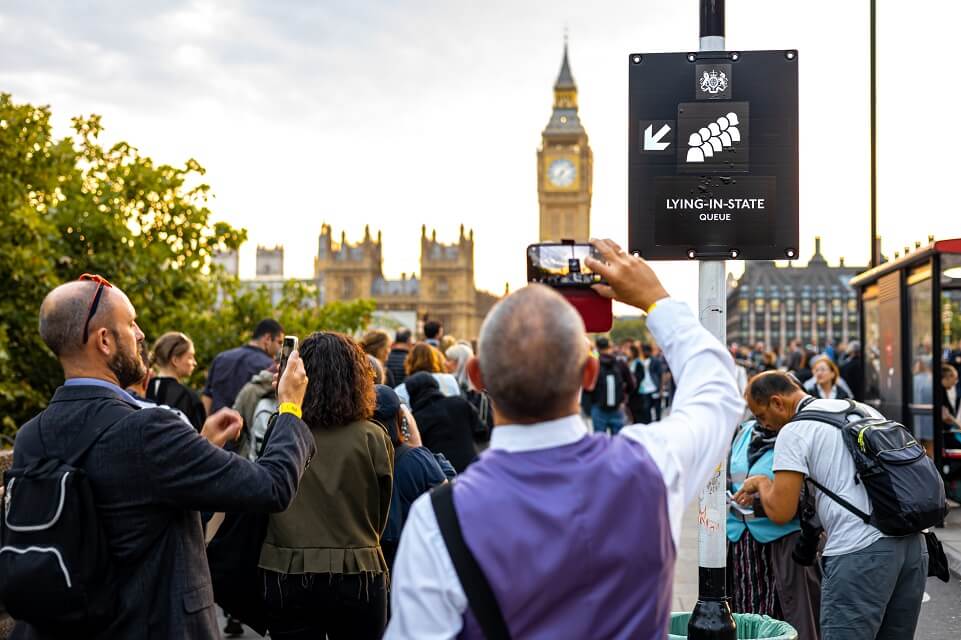Revealing study sheds light on feeling of collective loss and ‘Britishness’ after Queen’s death

Research on the public mourning after the Queen’s death offers new insights on how groups or crowds of people with a shared identity – in this case ‘Britishness’ – navigate periods of change and uncertainty.
Psychologists from multiple universities across the UK including Keele University and The Open University probed how those who queued to pay their respects in London and Edinburgh collectively navigated her death.
They say the findings could help inform how politicians might navigate periods of change in the future where the electorate has a shared identity. The research has just been published in the British Journal of Social Psychology.
The paper forms part of a larger project that explores who took part in the events following the monarch’s death, how they experienced their participation, and the impact it had on their understanding of themselves and their Britishness.
The queue
When the Queen died in September 2022 after 70 years on the throne, more than 250,000 people queued to file past her coffin in London’s Westminster Hall.
Four days after her passing, researchers spoke to people as they queued to pay their respects to the monarch in Edinburgh and London.
In studying “the queue” researchers wanted to understand more about the social and cultural significance of this period of uncertainty, as well as the importance of the monarchy – and this loss – to their shared identity.
Dr Sandra Obradović, a Senior Lecturer in Psychology at the OU, and lead author of the research paper under the guidance of Dr Sara Vestergren from Keele’s School of Psychology, said: “When we think about crowds, we often think about the ‘disruptive’ one, the ones that come together to challenge the status quo.
“In this project, we had an opportunity to study a different kind of crowd, one that comes together to assert the status quo, something particularly important in a moment of rupture, that opens a space for change.”
Findings
The researchers discovered people placed a huge significance on the Queen’s death and that it created an “in between” state in the public consciousness – a concept known as ‘liminality’.
In dealing with the collective loss, experts discovered that it prompted people to reflect on what the monarchy’s significance is to the British national identity.
Those they interviewed talked of the Queen being a representative of “Britishness”, and her death as a loss to the British national identity.
Others discussed the value of the monarchy as an apolitical and unifying feature in an otherwise divided society.
Dr Sara Vestergren, Lecturer in Psychology at Keele University, said: “It has been a privilege to be part of, and study, these events as they unfolded. As psychologists we were very excited to share these findings on how crowds like these transform people, create a hegemony, and how they define and develop British identity.”
Other universities involved in the study include St Andrews, Heriott-Watt, Canterbury Christ Church University, Sussex, Strathclyde and Bath.
Most read
- Keele University partners with Telford College and NHS to teach new Nursing Associate apprenticeship in Shropshire
- Emotion aware chatbot developed by Keele scientists offers transformative potential for mental health care
- First study of its kind sheds new light on Britain’s ‘forgotten’ World War Two decoy sites
- Keele cardiologist travels to Ethiopia to improve care for heart patients
- Keele academic wins prestigious prize for short story set in Stoke-on-Trent
Contact us
Andy Cain,
Media Relations Manager
+44 1782 733857
Abby Swift,
Senior Communications Officer
+44 1782 734925
Adam Blakeman,
Press Officer
+44 7775 033274
Ashleigh Williams,
Senior Internal Communications Officer
Strategic Communications and Brand news@keele.ac.uk.

